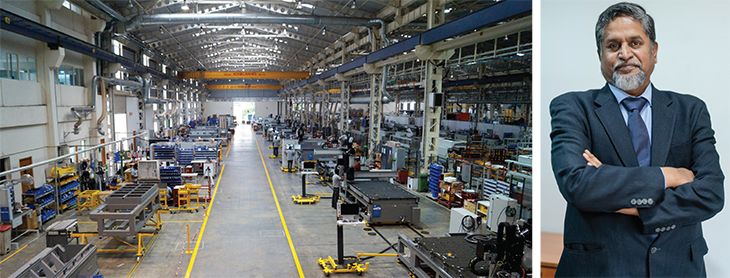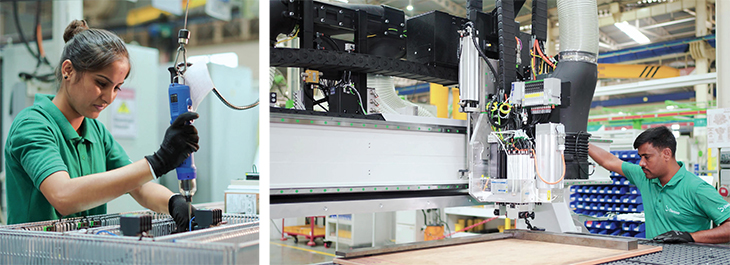Biesse India now a Multi-Material Expert
Biesse India, a global leader in manufacturing woodworking machinery, recently held its annual flagship event, Inside Biesse 2024, in Bengaluru. Apart from launching two new edge banders, it offered visitors the opportunity to witness the company’s latest advancements and capabilities through technologies and machinery used for processing wood, glass, stone and advanced materials. The company’s CEO, Sayeed Ahmed, spoke about Biesse India’s progress.

Come 2025 and Biesse India’s Technology/ Experience Center in Nelamangala will transform into a ‘materials hub’ for ‘multi-materiality’ processing. Its Managing Director since inception, Sayeed Ahmed (R), says trained personnel must be treated like knowledge assets, not mere operators who push buttons.
Biesse India was incorporated in 2007, and operations launched in 2008, with the intention of meeting the demands of the Indian furniture manufacturing market. The competence for development of products at the Nelamangala factory and tech experience centre was established from the very beginning in all areas: electrical, mechanical, automation, tooling and application support.
“It was found that India could export worldwide. So, we set ourselves up as an export-oriented unit for panel processing machines as well as manufacturing critical components required for the parent company in Italy,” Sayeed recalled. These included machinery components and castings that were fully machined and finished in Bengaluru.
The technology transfer was very smooth, with a highly supportive team at Biesse’s headquarters in Italy. “As we grew, and we found the quality of products made in India was good, and our exports started building,” Sayeed said. “So, we started adding more products. All the products that we make in India are designed here, with technology support from Italy.”
Growth has been shadowing Biesse India because it has constantly brought in new products for the world market. “Whatever we did for exports was also helpful to address demand in India,” Sayeed noted.
With state-of-the-art manufacturing, Biesse India is the only manufacturing factory of the company outside Italy. Biesse India has so far exported more than 10,000 woodworking machines in the mid- and higher mid-segments to Biesse’s clients in 70 countries.
In-house competence
Biesse India has developed its strength in machinery design and manufacturing in-house with the help of its R&D hub. “The electricals, mechanicals, automation, PLC software – everything is done in India,” Sayeed said. “Only the application software comes from Italy.”
The company has a range of advanced, computer-aided design and engineering tools, testing and analysis facilities in its Nelamangala factory. Its Product Management team proposes new solutions to meet customer needs, before jointly carving a business plan with the Italy headquarters in Pesaro.
New product development goes through a well-structured process, including rigorous prototype and beta testing under watchful eyes of specialists from Italy, before it is taken for commercial production.
Biesse has established global standards in the implementation of “lean” manufacturing. It means that the production line runs at an optimum speed to meet market demand while minimising wastage and optimising manpower and equipment utilisation.
“So, you are ensuring three things here: cost-effectiveness by reducing wastage, maintaining quality, and meeting the delivery requirements of the customer,” Sayeed explained. The car maker Porsche first introduced lean manufacturing in the parent plant in Italy. Subsequently the Kaizen school was established. Biesse has adopted these best practices, and all its India staff is trained in these programmes.
HSD SpA, a group company of Biesse, supplies electro-spindles, 5-axes routing heads, bevel gear boxes, servo motors and CNC drilling units for wood, aluminium and marble processing, glass and PVC. “We even supply these to our competitors,” Sayeed said.

The Nelamangala plant is the only manufacturing factory of Biesse outside Italy. Its state-of-the-art component and machine design capabilities have resulted in Biesse India exporting more than 10,000 woodworking machines to 70 countries.
Intense training
Bengaluru is known for machine building with a robust metal cutting industry. Building a supply chain, hiring engineers and establishing the R&D hub was relatively easy. However, according to Sayeed, all Biesse staff in India – be it manufacturing, technology, sales or service – are trained further as part of the company’s people development agenda.
“People come with competencies, but to take them to the next step, the parent company in Italy has a structured training programme. Most of our employees from various functions go through the intense training programme in Italy because we must replicate European standards and even go beyond that,” he said.
Apart from the huge potential in woodworking, Biesse sees an untapped market in glass, stone and composite materials processing. According to Sayeed, India is the third-largest producer of granite. “We export a lot of granite and marble, but there is little value addition,” he noted.
As of now, 80% of Biesse India’s products are made for woodworking, 15% is for glass and 5% for stone. “We are now focussed on value addition to stone processing. We now have products for processing composite materials, as well as high-tech metal cutting solutions,” Sayeed informed.
Branding & expansion
Biesse India started with manufacturing edge banding machines from the beginning. Initially they carried the Jade badge but are now under the Akron brand. In a couple of years from then, Biesse began producing pods and rail, and CNC flat table machines, largely grouped under the Rover brand.
This was followed with the beam saws for panel sizing and cutting machines for glass. In addition to meeting market requirements in India from its own line of manufacturing, Biesse India also provides higher technology solutions from its parent company in Italy, for wood and panel processing, glass, stone and composites materials.
For the machines that are imported from Italy, the team in India has competency to install and commission, train and provide after-sales services.
Known globally as woodworking people, Biesse will have completed a re-branding exercise next year, to exploit its industrial capabilities in processing other materials: wood, glass, stone, metal and composites.
“We are already a multi-material solutions provider,” Sayeed asserted, “Our product offers will be there for wood, for glass, stone, composite material and metal cutting.”
Also in 2025, Biesse India’s Technology/ Experience Centre in Nelamangala will transform into a “Materials Hub”, offering its customers the different technologies it has in “multi-materiality” processing. “We are planning to expand three times the existing size,” Sayeed added.
Furniture industry
There still are people who want just small edge banding machines. Then there are people who would like to go in for the CNC machines for high batch production, to have flexibility in their operation, and to have better quality of products.
The adoption of CNC machining technologies in furniture manufacturing in the country is a work in progress. India is becoming an industrial economy, where manufacturing is shifting from manual to workshop, and workshop to factory scale of production.
Quality consciousness, the need for flexibility in batch production, higher productivity and lean manufacturing are driving the change. There is also automation in processing and material handling.
“It is happening in India, slowly. People are asking for systems and automated lines. There is scope for all players because everyone is progressing to the next step,” Sayeed added.
Big players in the furniture industry – such as Featherlite, Godrej Interio, Neelkamal – who are making large volumes are already going in for manufacturing systems. They are being followed by medium-sized companies, such as Spacewood and Wakefit. Many smaller companies are waiting to upgrade and expand.
However, keeping in mind the vastness of the country and the burgeoning domestic demand for furniture, Sayeed feels the industry is very small, and the scope for expansion is huge.
To assist the industry to expand and upgrade, Biesse India has a technology application team. They are the “solution architects” to support customers with appropriate solutions. Sayeed says the team helps with consultancy to small and big players alike – offering them complete solutions.
In addition, Biesse has extended a helping hand to training academies such as the Advanced Woodworking Training Centre, Institute of Wood Science and Technology in Bengaluru, the Krishna Institute of Engineering and Technology in Ghaziabad, and the Hettich Poddar Wood Working Institute in Faridabad, with panel processing machines and training personnel.
Another Hettich Poddar Wood Working Institute for training in furniture-making is scheduled to be fully ready with Biesse machines in Bhandup, Mumbai next year. Here, Biesse India will provide panel processing machines and support to conduct regular training programmes and “master classes” to aspiring students, entrepreneurs and re-skilling existing workforce.
“Trainees will be able to see how to operate and program the machines, what roles the critical components play, and get full-fledged training on machine maintenance and troubleshooting,” Sayeed said.

Biesse India was set up as an export-oriented unit for machinery, components and castings. All products made in India are designed, fabricated, assembled and tested in-house.
Going hi-tech
What role is artificial intelligence (AI) and Internet of Things (IoT) playing in the design and manufacture of Biesse’s machines, now and in the future? So far as AI goes, it is in use in the company’s production management and production control, where there is enough data to work on.
“We have our IoT platform, that’s how remote diagnosis is done, and people can solve problems. All our machines run on the IoT platform called Sophia. AI and ML can do the deep diving in Data lake, understand what the problems are and propose the solutions that can be applied,” Sayeed informed.
So far as benefits to Biesse’s customers is concerned, AI can help them manage the shop floor and integrate automation and robotics in the manufacturing process. It can also assist in technical training of factory employees.
India already has some big manufacturers to take to high-end AI-linked systems, but adoption is slow because of the initial investment. “But when we talk on returns on investment on robotics and automation, data analysis will show that for specific applications the payback is lurking on the horizon,” said Sayeed.
Bengaluru is already the global support hub for Biesse: it looks after spares management for the entire Biesse range of machines in the Asia-Pacific region, including those for machines not manufactured in India.
Biesse also has its hotline (24x7) support hub in Bengaluru for all English-speaking countries worldwide. Biesse in India has developed mobile app to assist customers in regular maintenance activities or problem-solving. “That shows the competence of Indian engineers,” Sayeed quickly pointed out, rightly!
Cost & culture
On India being a price-sensitive market, Sayeed noted: “Yes, it’s a price-sensitive market. But where it is not funny is that this competition is at their own cost! When we talk about cost to our customers, we also include performance, quality, safety, service and support.”
Customers looking for better performance, guarantee of quality, and assured service and support in the long term choose products that may also command a premium, he added. Longevity of equipment while maintaining its performance over the life is one of the pillars for circular economy.
What about employee skilling and attrition? It is the responsibility of the employer to retain trained people. “Trained personnel must be treated like knowledge asset; they are not just simple operators who push the buttons. They must be really treated with with trust and care,” Sayeed said.
“Treat your people properly, create good and safe working conditions in day-to-day operations. They build in quality in the work they do, they show the performance of the machines,” he noted.
Parting shots
On what ails the Indian furniture manufacturing sector, Sayeed observed that the absence of resource optimisation, rampant wastage, inefficiency in processes, and lack of preventive maintenance of machines was glaring.
He opined that each manufacturer must install some form of ERP (enterprise resource planning) system to manage day-to-day business activities, including accounting, procurement, project management, risk management and compliance, and supply chain operations.
Another lacuna is the lack of brands in Indian furniture industry. By not making any compromise on product quality, a manufacturer can really begin establishing a brand. “I think most important thing that is missing in India is the total lack of furniture design. Today most of it is copied,” he said.
On the positive side, Sayeed sees the industry as being optimistic about its growth. “They are looking for opportunities, they are investing in projects, and doing what is required for the industry’s growth,” he signed off.
Comments

- ‘Red gazelle’ makes window installation easy
- Felder’s solutions for window and door production
- Versatile sliding-folding systems from Hafele
- Door line automation from Woodtech Consultants
- Accutec solutions for uPVC windows
- Jowat’s VOC-free primer for window profile wrapping
- Flexible solutions for doors, windows from SCM
- Tostem introduces Giesta steel doors; calls for dealers
- Folder system by Salice optimises cabinet space
- Turakhia has top-quality veneers for doors
- Mirka has solutions for difficult sanding of doors
- When Lamello’s Cabineo became a game changer
- Digital lacquer embossing for flooring from Hymmen
- Weber sanders help achieve luxury surfaces
- Rehau has designs on growing edge band market
- Samet ties up with Greenply to tap Indian hardware market
- IMA Schelling sets up base in India
- Hettich earns BIS nod for hinges, runners
- Biesse India now a Multi-Material Expert
- The importance of selecting the correct tools
- Indian cabinet maker shines at Lyon WorldSkills
- ‘Collaboration holds the key to success’
- Fibreboard recycling becomes a reality
- MumbaiWood now a recognised destination
- Knock on wood: A bouquet of training courses!
- Ligna 2025: ‘Thinking in circles’
- CIFF-Shanghai focuses on furniture design
- Felder hosts in-house show, Technology Days
- Interzum Forum Italy makes impressive debut
- Koelnmesse ties up for 3-in-1 Jakarta fair
- WOFX: a global hub for innovation and growth
- Events Calendar: industry fairs you must visit
- 3D is printing sustainable housing solutions
- Hard or soft? Researchers discover new wood type
- Master, apprentices take AHEC’s cherry challenge
- ‘Zero-to-launch’ modularity transforming hospitality
- ICA’s Urban Matter is about satin-finish metal effect
- MTC’s ‘Woven timbers’ create waves
- Impact of material in interior design
- Underestimated danger: Sharp edges
- Playing safe on clothing storage units
- ‘Green’, 3D-printed panel floors it!
- Adhesive-free joining of wood, metal
- Energy-efficient manufacturing of fibre-based products
- Rice bran wax: a sustainable alternative
- Dual-side hand sanding block has unique features
- Bio-based products for sustainable development
- ‘Wood Vaulting’ may enhance CO2 sequestration
- Protecting forests through advanced AI
- Forest certification benefits wildlife too!
- Elizure, the Rolls Royce of laminates!
- Rehau unveils new Rauvisio Riviera collection
- Hawa Concepta III: upgrade to seamless functional doors
- Hafele’s RE-Twist locks in on security
- Optimus machines feature tomorrow’s technology today
- Merino unveils cutting-edge offerings
- Ornare launches new premium laminates
- New nesting models from SCM
- Advanced moulder, membrane press from Woodtech
- Greenlam Laminates unveils exclusive display centre in Pune
- EUDR implementation dates may be deferred
- Herman Miller introduces bamboo upholstery
- Altendorf named ‘Brand of the Century’
- Catas to verify its test reports
- Combilift wins two prestigious awards
- Holz-Her management transition
- Replica of the Oval Office opens
- Ozone Blu sets up experience centre
- SCM opens new subsidiary in Slovenia
- VDMA faces business stagnation
- RentoMojo reports strong growth in FY24
- Century Plyboards on expansion mode
- Subhra named DG of FSC
- Meta to assist Skill India Mission
- Sugatsune opens Bengaluru experience centre
- Dieffenbacher acquires Pagnoni
- Pepperfry partners with Infra.Market
- Hafele opens light store in Chandigarh









































